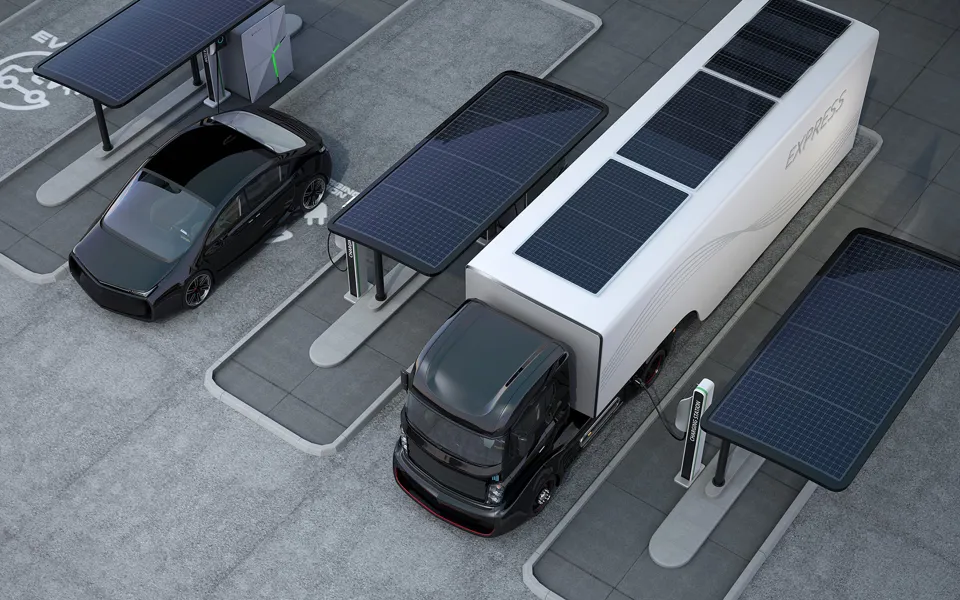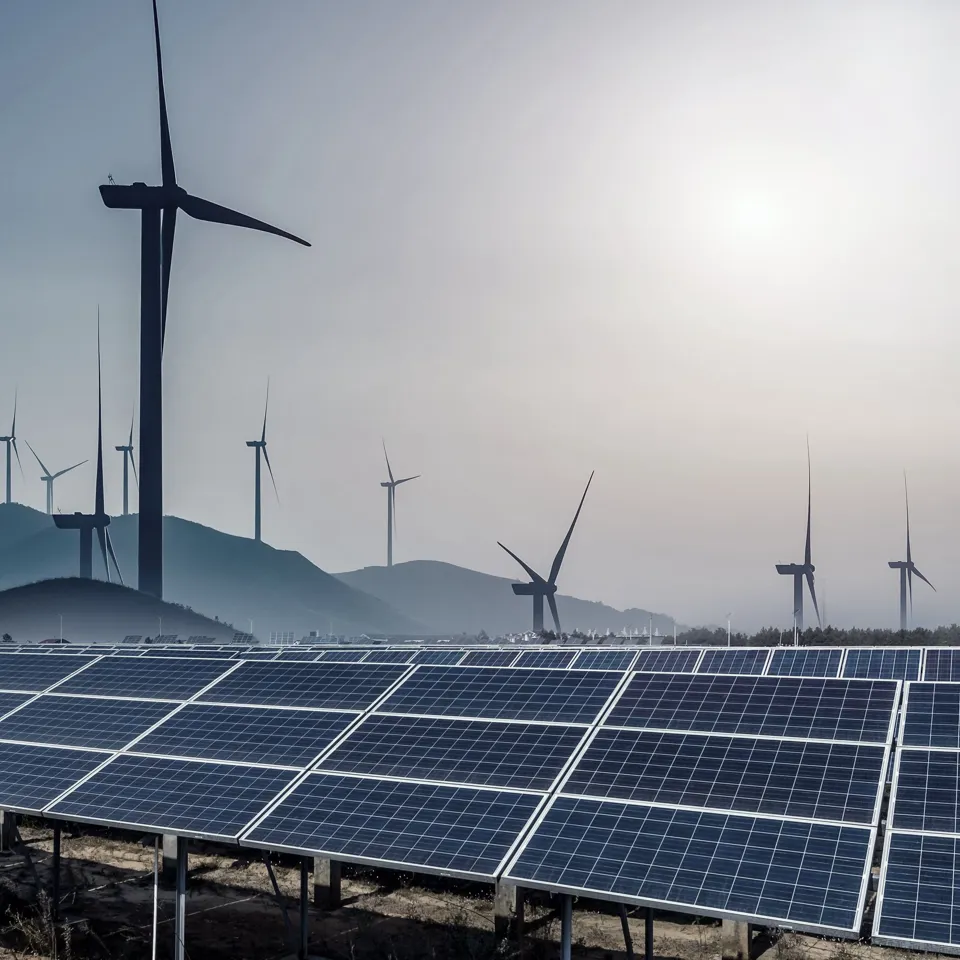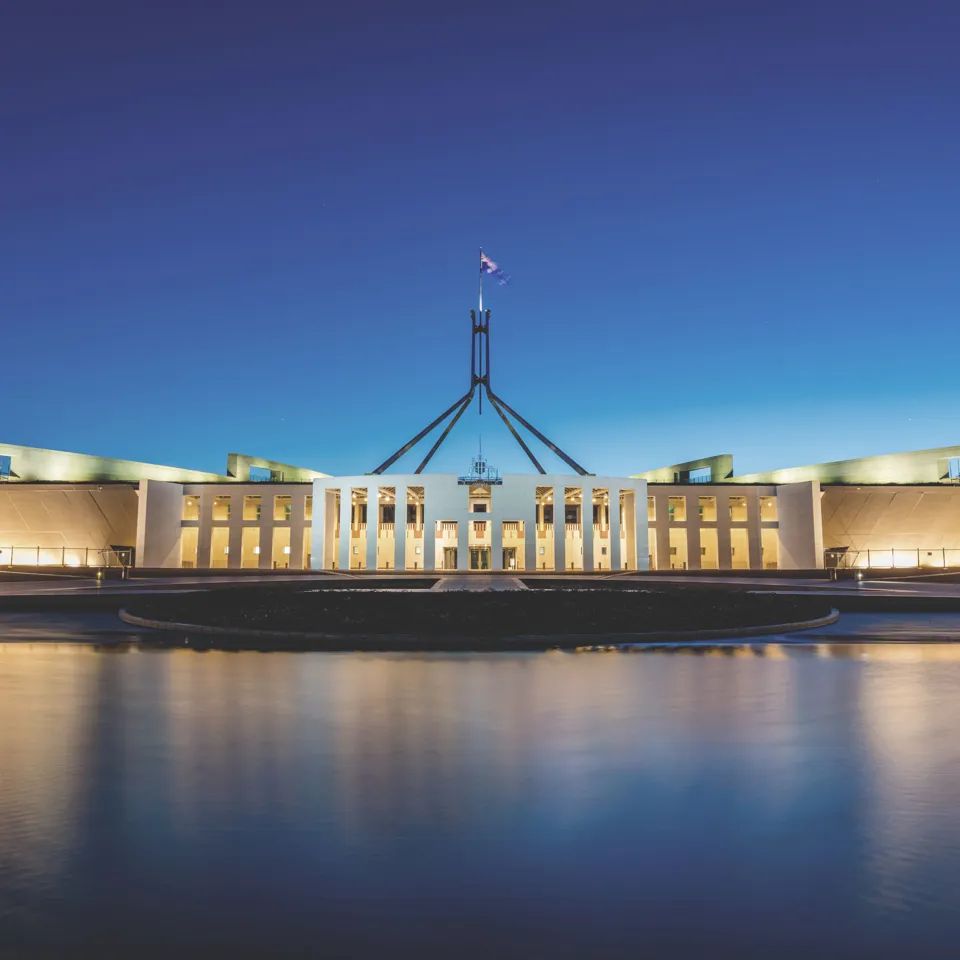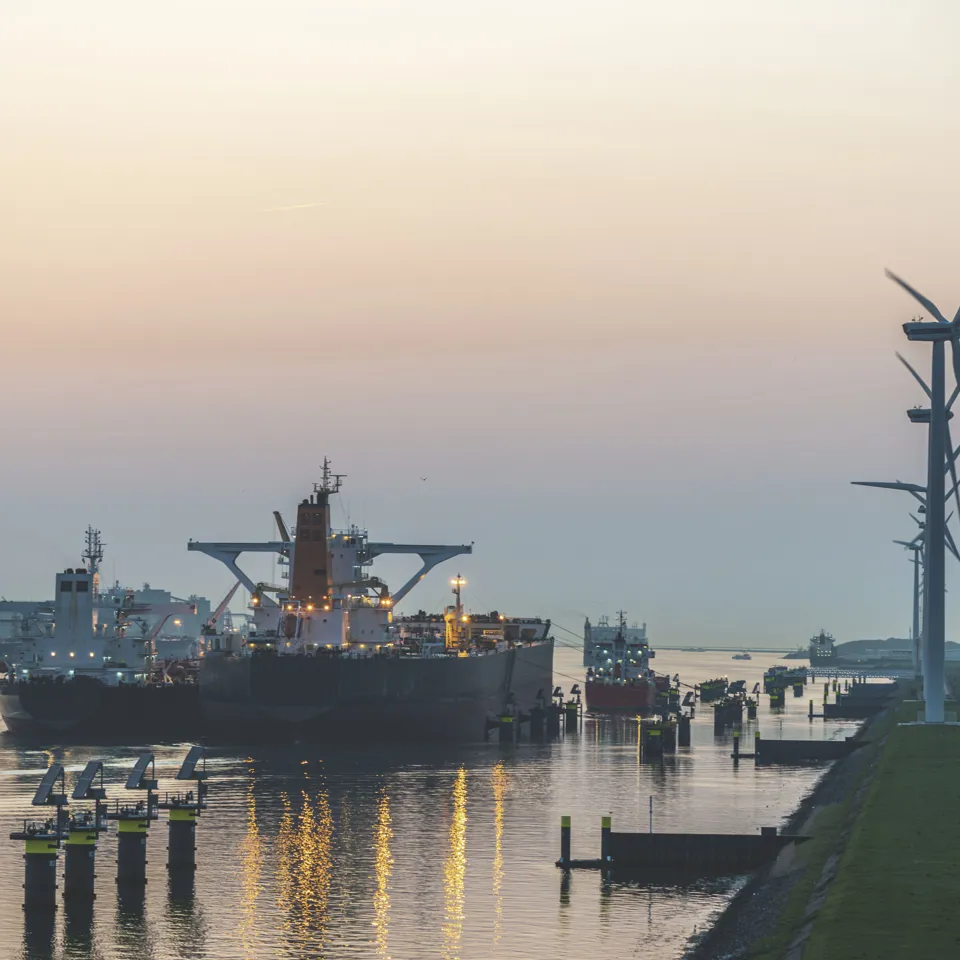Renewable energy
Our experience
Decarbonising energy supplies by implementing local renewable energy infrastructure combined with battery energy storage systems (BESS), is a key part of achieving net zero carbon emissions and mitigating against increasingly high and volatile global energy prices.
Projects

Riding Sunbeams - the solar powered railway
Read project
Hydrogen fuel cell for commercial trucks
Read project
Fuelling Scotland's Ambitions: A Hydrogen Research Study for Scottish Distilleries
Read projectOur capabilities in renewable energy
How will your organisation transition to renewable energy sources, for example electricity, heat or transport fuels? We can prepare a plan and roadmap to appraise your options and ensure a co-ordinated approach to implementation and monitoring. Our team can deliver internal communications, awareness-raising activities and training workshops to support the launch of your energy transition roadmap.
Ricardo drafted first official IRP for the electricity sector in Bermuda, outlining a clear path for the island to generate up to 85% renewable energy by 2035. Ricardo also conducted the modelling that underpinned the IRP.
The project was delivered in two phases. In the first phase Ricardo reviewed a draft IRP that was prepared by the electricity utility. When the first draft was found to be lacking in ambition for renewable sources, Ricardo was asked to prepare an alternative IRP with renewables playing a greater role.
Following this study, Ricardo was contracted by the Regulatory Authority of Bermuda to support with the implementation of the key recommendations of the IRP, including the development of competitive procurement guidelines and pre-feasibility studies for solar PV projects.
The Ascension Island Government is keen to assess its options for increasing the contribution of renewable energy as well as transitioning the island to electric vehicles. This is driven by its aspiration for increased energy security, reduced carbon emissions and potential for long-term cost reduction.
The government engaged Ricardo to conduct an options appraisal and feasibility study that will form the basis for future grant-funding applications, investment proposals and regulatory decisions.
In a project to develop decarbonisation pathways for 12 prison sites we assessed the energy performance of each site (heat, power and building fabric), as well as their physical characteristics and layout, and then proposed measures to improve their energy efficiency, generate renewable power and to decarbonise the residual electrical and heat demands.
We then modelled the options over time for the energetic and economic performance of each site along its timeline to 2050. As a result, the client had a coherent and costed selection of measures for each site which work together to achieve net zero targets within a clearly defined timeline.
At the feasibility stage we examine the viability of your proposed development(s) to identify technologies, any benefit of BESS, site suitability and land use planning, energy demand and yields, connections (private wire or distribution network operator) and the economics of your investment (price per kWh, ROI, etc).
Our diagnostic approach ensures that your targets can be met realistically while minimising risk and cost. With the rising price of energy, offsetting your supply from the grid typically offers better value than exporting to the grid, so we size schemes to optimise economics rather than maximising the size of installation.
Our breadth of technical expertise spans the energy, waste, food and drink, manufacturing, finance and transport sectors. This enables us to evaluate all options and identify the most suitable path for you, while working with your facilities management to verify the viability of the project.
Our experts offer due diligence and investment screening advice. We are also able to advise on eligibility and access to sustainable finance.
Solar farm feasibility study
Ricardo was commissioned by a local authority to assess the costs, benefits and risks for a ground-mount solar PV system on land owned by the council. The study scope included assessment of key factors impacting on project viability, including:
- Technical and construction constraints
- Planning - including environmental impact assessment (EIA)
- Electricity sales - via corporate and synthetic power purchase agreements (PPAs)
- Connection to the electricity distribution network
- Connection to neighbouring sites via private wires
- Integration of battery storage
We worked with a major media provider to develop a large-scale wind energy project that would generate electricity to power their strategic remote island site and support the island community. We supported the client at every stage of this development, including:
- The initial feasibility study examining all the renewable energy options that were applicable
- Detailed feasibility study on wind energy
- Development of the business case for the capital and project development budget 3,000GBP
- Monitoring of wind energy at the development site
- Environmental impact assessment
- Support to apply for, and gain, planning approval
- Preparing the technical specification for the turbine purchasing contracts
- Valuation of tender returns
We can support with development consents including:
- Land ownership and wayleaves
- Planning and environmental impact assessments – screening, scoping, application and closing out conditions
- Offtake arrangements – onsite connection and/or private wire, distribution network operator (DNO) connection, power purchase agreements
Our team has a developer background so we understand how to manage risks in a cost-effective way.
A solution was required to address local electricity reliability and supply issues. We needed to find an appropriate way to use farmland and remove native grassland without having a detrimental effect.
The technical solution we provided:
- Involved 93.75ha of land for a solar energy facility and included a 44MW solar farm and 50MWh battery storage facility.
Contributed to the rural economy of Wellington Shire.
Integrated with agricultural uses.
Ricardo delivered a complete service, involving the coordination and management of stakeholders including planners, the State Government, land owners, communities and the CFA. We also provided expert guidance in accordance with the Victorian Government’s new 'Solar Energy Facilities – Design and Development Guidelines'.
Ricardo supported the distillery in the contractual and regulatory arrangements associated with developing a private wire electricity supply from a neighbouring renewable power generator.
Work included:
- Developing heads of terms for private wire PPA
- Understanding regulatory issues including metering, licencing and carbon reporting
- Outline grid connection design and management
- Cost structures for connection
- Private Wire project risk register and project Gantt
Our experts add considerable value in procuring suppliers of renewable energy infrastructure. We provide a range of procurement and bid support services ranging from “light-touch” to “hand-holding” depending on your organisation’s budget, resource or time availability.
Our procurement and contracts specialists provide support, as required, throughout the procurement process, from drafting the tender documents and identifying potential tenders through to tender evaluation, negotiations and contract award.
Riding Sunbeams Limited (RSL) was set up with the mission to develop directly connected solar for railway traction systems.
Ricardo supported RSL in the development of the concept design, tender specifications and tender evaluation for the 4MWp PV farm at Cuckmere and private wire connection to a Network Rail substation.
Our client was developing a unique housing development with solar PV and a battery system serving the entire site. This included linking all PV systems to the battery – to optimise the energy demand and generation across all the new homes – supporting an energy services company (ESCO) model.
Ricardo’s team delivered technical assistance with grid connection of the 2MWh battery; assessment of battery tenders, ranking each based on price, performance and risk; and commercial support on ESCO revenue streams, consumer tariffs etc.
Our engineers can provide contract supervision services to give you peace of mind that the EPC contractor’s detailed design and subsequent construction meets the functionality and performance requirements of the EPC contract. Services can include:
- On-site monitoring
- Reporting that works undertaken by the EPC contractor are in accordance with the specification
- Witness tests, inspections, quality checks
- Monitoring the completion and commissioning process
- Monitoring the take over and acceptance processes
Owner’s consultant role provides concept design and contract management
Our energy team worked with a community-based electricity trust, to develop a concept design, lead on procurement, and deliver contract management for an upgraded micro-grid, which incorporated wind turbines, solar PV, small hydro and batteries.
We undertook an owner’s consultant role and supported the implementation of a micro-grid refurbishment project, which included the installation of multiple 6kW wind turbines, repairing a solar PV array, refurb of a small hydro system and evaluation of battery storage options and development of funding for the replacements through the CARES programme.
Foula is one of the most remote locations in the UK and upgrading the electricity provisions is always very challenging due to the increasing need for localised capacity and grid strain. We were chosen to support the project implementation due to our robust experience of working with islands and isolated locations.
Our support included:
- Developing the concept design
- Procuring an EPC (contractor) for the infrastructure project
- Defining the equipment specification
- Validating EPC/system performance
- Managing the contract
The remote nature of the project was a challenge, but we demonstrated our experience in dealing with remote locations, by ensuring that we completed the delivery process and installation on time and to budget.
Ricardo also provides transaction services to vendors and investors, including:
- Technical & Environmental Due Diligence
- Sustainability Due Diligence
- Techno-economic modelling
- Third party validation services
- Investment-grade proposals
- Investor decision support

Why is implementing renewable energy important for your organisation?
Your organisation’s transition to low carbon energy will not only help to protect you from the negative impacts of climate change, but also provide the following benefits:
Cost reduction
Reduce your energy bills by reducing your reliance on volatile and rising energy supply prices.
Risk reduction
Increase energy resilience to minimise the risk of disruption to your business operations.
Legislation preparedness
Increase your adaptability to future environment and climate change legislation.
Budgetary control
Regain control of your energy and carbon emissions budgeting.
Differentiator
Demonstrate sustainability leadership as a market differentiator.
Meet market demands
Satisfy the sustainability demands from your investors, customers and employees.
Renewable energy Resources


















